Motivation can make or break your success; it’s what allows us the vision to achieve our goals. But, depending on the size of these goals, they sometimes feel insurmountable which leads to demotivation, procrastination and doubt.
According to a meta-analysis of research done by the University of Calgary psychologist Piers Steel, 80 percent to 95 percent of college students tend to procrastinate.
And the more that you put off a goal, the harder and less likely you are to achieve it.
However, proper motivation doesn’t have to be difficult. In fact, improving the way you see success can be the easiest way to achieve your goals. Whether you aim to lose weight, run a marathon or finish a big work project, these 20 motivation tips can help you accomplish any goals in life, work or fitness.
You can jump to the infographic below or read on to check out these tips; each is backed by a scientific study.
Life Motivation Tips
Sometimes a busy schedule can get in the way of achieving your goals. Other times you might just feel too lazy to get off the couch. Either way, here are some simple tips to help you get motivated in life.
1. Simplify Your Daily Goals

Research published in Clinical Gerontologist showed that having a goal is important to your overall motivation. If you don’t know what you’re working toward, then you are going to have a harder time visualizing success. That being said, sometimes a complex goal itself can feel too overwhelming.
To combat this, pull back on the intensity and specificity of the goal. For example, instead of a goal of losing ten pounds in a month, make your goal to simply exercise once per day. This will not only improve your motivation, but will help give you some quick wins and help promote progress overall.
Tip: Instead of having a goal to hit the gym for 2 hours, just try to consistently make it to the gym.
2. Plan Out Your Week

Having a goal is important to your motivation, but sometimes it’s not enough. If there is no plan for progress in your goal, then it’ll seem like you're not succeeding.
A study published in the American Journal of Physical Activity and Health explains that setting a goal isn’t enough to actually change behavior, but that setting up a plan—especially when you already have a goal in place—will motivate you to reach your goals.
However, the study also pointed out that planning only helped with motivation if people were already motivated to change.
Tip: Plan out your week in a planner with specific goals you want to hit in mind.
3. Don’t Compare Yourself to Other People
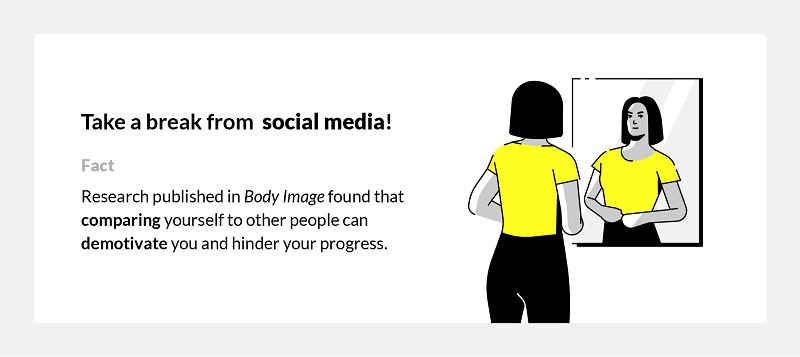
According to a study published in the academic journal Body Image, social media can have a negative influence on the way you see yourself.
Continuously comparing yourself to “successful” influencers can slow your progress. Doing so can demotivate you from your exercise regimen and negatively affect your overall health.
Instead, follow accounts that promote body positivity. These can have much better effects on self-esteem if they fight the stigma of different body types. And as we already know, positive thinking can improve one’s motivation.
Tip: Don’t abandon social media; refocus the feed to motivational accounts or body-positive influencers.
4. Send Updates to Friends

Researchers from the Dominican University of California found that people who sent weekly updates to their friends were more likely to complete their goals. In fact, the research showed that sometimes people surpassed their goals.
Taking this research into account, document your progress with your goals and update a friend about them every week. Doing so will emphasize how close you are to your goal.
Tip: Send weekly updates to a friend or family member, emphasizing how close you are to your goal.
5. Reward Yourself Immediately

Rewards have a tendency to go hand in hand with motivation. However, when it comes to a delayed reward or an immediate one, an immediate reward has been shown to increase motivation.
According to research published in the Journal of Personality and Social Psychology, the timing of the reward was completely independent of how big the reward is. If you are succeeding in something, an immediate reward will improve your overall motivation.
Tip: Give yourself a simple present for completing a goal each day, like a piece or chocolate.
6. Listen to Heroic Music to Get You Going

It’s no secret that listening to music can change your mood. A study published in Scientific Reports found that heroic sounding music was often associated with feelings of motivation and empowering thoughts.
Whether it’s going for a walk or completing a report for work, listening to the right kind of music can have impressive results. While doing an activity, listen to upbeat music to help motivate you to complete a task.
Tip: Listen to heroic music to pump you up before you set out to complete your goal.
Fitness Motivation Tips
It can be difficult to go to the gym or change your diet, and it’s especially tough to change your habits that are already deeply ingrained in your daily routine. However, there’s still hope for those of you who wish to improve your physical fitness, shed some pounds, or put on some muscle.
7. Turn it Into a Game

Research from the Perelman School of Medicine at the University of Pennsylvania and Boston University School of Medicine found that mixing video game elements with working out can improve the chances of sticking with a workout routine.
The process, known as gamification, is effective as it allows people to treat their workout like a game. By meeting goals, and “leveling up” their workouts, people are more likely to commit to a workout.
There are fitness apps and games available to use in conjunction with wearables with specific fitness goals you can reach. But, if you don’t have access to those, you can also play games with friends and family.
Tip: Use a fitness tracker and app with set goals, like a video game level up system, to improve attendance.
8. Get a Dog

Having a friend to work out can motivate you to exercise. But, sometimes finding a friend to workout with you all the time can be difficult.
Luckily, your workout buddy doesn’t need to be human: dogs need to be active as well, and who better to work out with than your favorite furry friend?
Research published in the journal BMC Public Health found that dog owners walked about 22 minutes more a day than those who didn’t own a dog. Not only that, but the exercise was at what the CDC considers moderate intensity.
Another study that looked at motivation for walking dogs found that many owners walk with their dog to keep their dog healthy, which helped increase the self-happiness in the owner, thus creating a “symbiotic feedback loop” of betterment for both human and dog.
Tip: Take your dog out for a walk every day for 30 minutes at a moderate pace (not jogging, but not a stroll either). You’re doing it not only for your health but for your dog’s health as well.
9. Think Positively

Sometimes, we really do let our minds get the best of us, and that affects how we see exercising. A study conducted at the University of Freiburg in Germany revealed that those who started exercising with a positive attitude found the workout less strenuous.
In essence, if all you think about is how tired you are, then you’re not going to be able to exercise successfully. Positive affirmations can help boost your morale and overall confidence in the workout.
It should be noted that positive attitudes weren’t always enough to stop feeling athletically inadequate. But, in those cases, the study found that those who bolstered their workout with the right athletic product, like shoes or clothing, helped them feel more confident.
What this means is that you should get what you believe will help you feel better at exercising (within reason). It’s not cheating, it’s helping you think in a more positive light, and that’s the point. Positive thinking helps.
Tip: Start your day on the right foot by doing something positive, like listening to a happy song, reading encouraging notes, or complimenting someone.
10. Join a Group
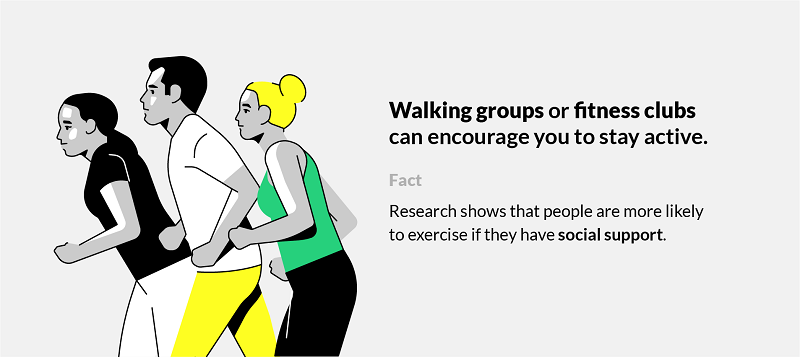
If you’re having trouble staying motivated to continue a workout routine, one recommendation is to join a group and find a community. Research published in the International Journal of Technology Assessment in Health Care has shown that walking with a regular group will help someone stick to an exercise regime.
This goes back to having support; if others support you, you’re more likely to continue your physical activity. Even if it’s just a walking group, having that support can improve your motivation to get physically active.
Tip: Join a workout community like Crossfit or a walking group on Facebook to help motivate you to stay active.
11. Sign a Contract

Contracts are a great way of making something real; it’s a physical promise that will make you more likely to follow through.
Research published in the Journal of Behavioral and Experimental Economics has shown that commitment devices, such as personal contracts, have helped raise attendance rates at community health programs. By introducing a way to hold oneself accountable, the studies showed that commitment to health increased.
It may seem a little silly at first, but signing a contract is a way to get you motivated to stay active. Take it a step further and add a realistic health goal to your plan like avoiding alcohol for a week. Or, add in a penalty, such as paying your friend for each time you don’t go to the gym for an added bonus.
Tip: Sign a contract with a friend committing to exercising for a set amount of time each week, aiming for a specific goal. Add incentives and penalties for not reaching your goal to boost motivation.
12. Decide Why You Want to Lose Weight

Research published in Clinical Gerontologist showed that people between the ages of 51-84 years old, who participated in goal-setting—the process of establishing goals—improved their motivation to alter their lifestyle in a healthier way.
Figure out your goal—it can be anything from preventing diabetes to simply fitting in an old suit. Having clear, identifiable goals will improve your motivation to lose weight.
Tip: Find out why you want to lose weight in order to gain the motivation to do so.
13. Check-In Daily
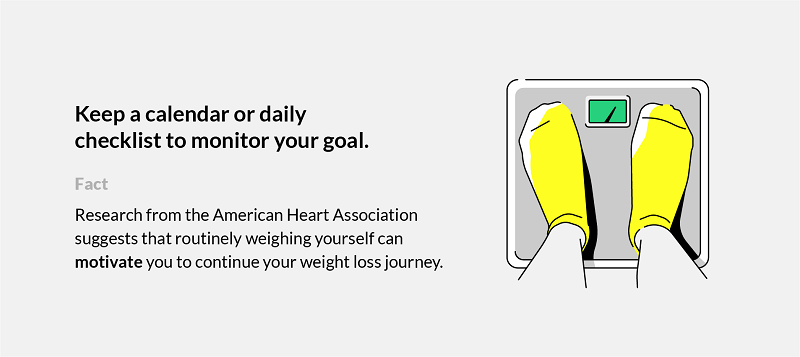
Research from the American Heart Association suggests that routinely checking on your weight promotes an increase in weight loss motivation.
By allowing yourself to see the results of your hard work, you’re able to fully see how your hard work is succeeding. It’s like being able to observe your goals you’ve written become a reality, boosting your self-confidence.
Tip: Weigh yourself before the start of each day, and allow a 5-pound allowance.
Motivation Tips for Work
Between answering emails, laboring through Zoom calls, and putting together reports, work can seem overwhelming. But, those that are successful at their job are usually those that also feel fulfilled at their job. Here are some easy ways to stay motivated at work.
14. Strike a Power Pose

There’s a simple trick to improve motivation that anyone can do, no matter who they are: stand like Superman or Wonder Woman.
Social psychologist, Amy Cuddy found that those who took a “power pose” for a few minutes before a task felt more empowered than those who didn’t. To achieve the power pose, all you have to do is stand straight and tall with your hands on your hips.
Tip: Before you tackle a goal, put your hands on your hips, and stand like a superhero for two minutes while going over the task at hand.
15. Make Your Goals Open, but S.M.A.R.T
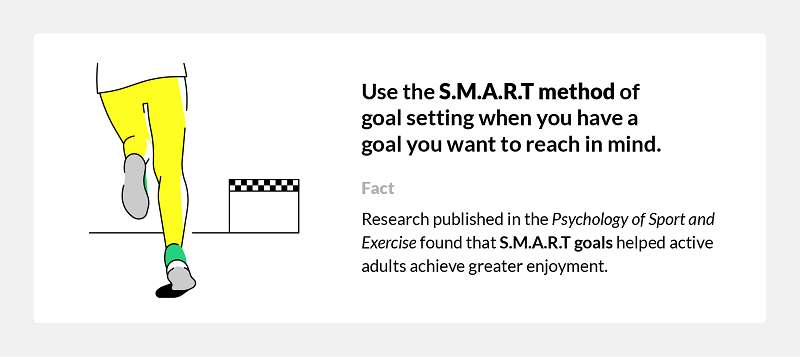
Goals and motivation are clearly closely connected, and setting your goals has a clear precedence in becoming motivated. However, when it comes to physical activity, it may be prudent to keep your goals a bit open, as explained by a study published in Psychology of Sport and Exercise.
The study showed that people felt a greater sense of achievement when they utilized an open goal style of goal setting, i.e., being flexible with their goals.
However, a follow-up study in the same journal dug deeper and showed that people who were already active were able to exercise more when they used the S.M.A.R.T method of goal setting.
This shows that when you’re starting off, you should have a general idea of what your goals are. When you find that you’re more active, use the S.M.A.R.T goal-setting method to help you become more motivated to achieve your goals.
Tip: If you’re just starting off, keep your goals open; when you’ve developed a habit of being active, use the S.M.A.R.T method to work toward your physical goals.
16. Try to Finish, Not Be Perfect

Completing a task is more important than trying to complete a task perfectly. Perfectionism hinders progress. According to an article by Dr. Amy Charland, a wellness coach at the Mayo Clinic, perfectionism creates an inconsistent motivation by forcing a person to think in black and white.
Instead of perfectionism, acknowledge that things are never perfect and focus on progress and improvement. To apply this, simply focus on looking back and seeing how far you’ve come, rather than how far you have to go.
This also coincides with creating a specific goal: if you know where you’re going, then you don’t have to worry about being perfect. You know your goal, so instead, take pride in how far you’ve come.
Tip: Aim for improvement rather than perfection, so you don’t create impossible obstacles that can deter you from what you want to do.
17. Dress the Part

“Dress for success” isn’t just about being ready for the day, but about acknowledging that what we wear influences our behavior. This isn’t just a simple theory either: enclothed cognition describes the influence our clothes have on our performance.
A study (and follow up study) reported in the Journal of Experimental Social Psychology found that clothes influence the way we think, feel, act and behave. Simply put, our clothes can help our motivation.
If you’re looking to feel motivated working out, wear the gym clothes you feel comfortable in. If you want to be motivated for work, dress confidently (albeit within company policy). It’s a simple way of improving your outlook and overall motivation in all aspects of life.
Tip: Wear clothes that make you feel your best—at work and at the gym.
18. Take Strategic Breaks

The human mind needs breaks to improve focus and motivation. A study conducted by DeskTime found that the most productive employees took effective breaks throughout the day. Taking these breaks allows their work to be treated like a sprint, dedicating 100 percent of their focus in short amounts of time.
Repetitive tasks can lead to cognitive boredom. By “sprinting” your focus, and then resting, you’re effectively refreshing your mind at integral moments, sharpening your focus. In order to achieve this focus, use a time management method, like the Pomodoro technique.
The Pomodoro technique breaks down work typically into 25-minute intervals with a five-minute break in between. Using a time management technique like this allows you to rest your brain and sharpen your focus on the tasks at hand.
Tip: Utilize the Pomodoro technique to take scheduled and meaningful breaks between bouts of work to improve focus and motivation.
19. Eat Brain Foods

Nutrition has a hand in your mental capacity. This isn’t to say that there is any one food to eat that will automatically improve motivation. Rather, a healthy diet can improve your mental well being.
As explained by Doctor Fernando Gómez-Pinilla, Professor and Director of the Neurotrophic Research Laboratory with a secondary appointment in Physiological Science at the David Geffen School of Medicine at UCLA, dietary changes can enhance brain function.
However, just eating these foods is not enough. You have to maintain a healthy diet to reap the full rewards. Start introducing foods that are rich in omega-3 fatty acids, B vitamins, and antioxidants into your diet. They’ll help improve our brain function and your overall motivation.
One suggestion to start off with a keto-friendly diet, as it includes many foods that also happen to be brain foods.
Tip: Introduce these foods into a nutritional diet: fatty fish, berries, nuts, avocado, leafy greens, tea, and coffee.
20. Take a Walk Outside
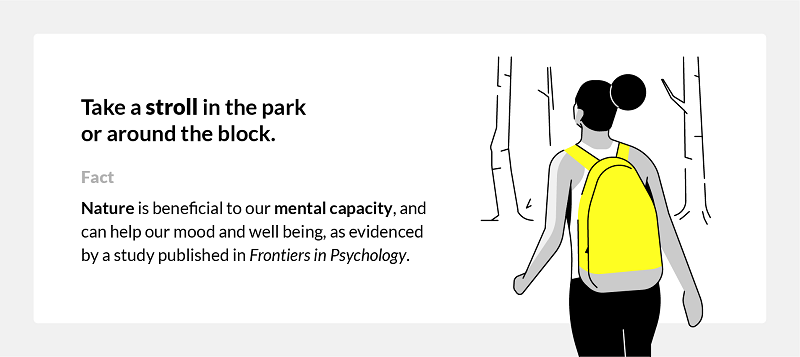
Nature is healing to everyone, and studies—such as the one published in the Frontiers in Psychology journal—have shown that simply taking a stroll outside can improve our physical and mental well being.
Taking a walk outside also assists in taking a break from focusing on whatever work you were doing. You give yourself a chance to take a break and breathe in the fresh air. By doing so, you’ll be able to get some clarity and refocus your attention, improving your motivation.
Tip: Go for at least a 5-minute walk outside among some greenery. It’ll improve your mood and boost your motivation to finish your tasks.
Whether you’re looking to live healthier or work smarter, motivation is important. Feeling like you can succeed can change how you approach life. By trying out these motivation tips, you are taking the steps needed to positively affect your life. Even doing something as simple as adding a protein supplement can have a major impact on your motivation to improve your life.






